Whilst political decision makers have been failing to respond to the urgency of the climate crisis during negotiations at COP 23, young people have challenged them from inside and outside the climate conference halls.
COP 23, the UNFCCC international climate change negotiations, took place in Bonn, Germany in early November 2017. The talks were presided by the Island nation of Fiji, although this leadership did not bring as much prominence to the struggles of developing nations as had previously been hoped.
Many politicians and delegates of EU countries presented themselves at the COP as clean, green, charismatic world leaders. However, the reality of their actions at home and globally tell a much darker story. Countries in the global north continue to support and profit from destructive fossil fuel projects, many of which are based in the global south.
Meanwhile, real, dynamic, youth led resistance has been highlighting this hypocrisy, hitting the headlines and outshining the blatant emptiness of leaders speeches.
The Pacific Climate Warriors, a youth led group from the Pacific Islands were an unstoppable force within the fringe events around the COP. Their actions, ceremonies and speeches were incredibly powerful and really hit home to their audiences the importance of urgent climate action.
Other youth groups from across Europe and the world also led inspiring resistance efforts inside and outside the COP.
Norway
Natur Og Ungdom (Young Friends of the Earth Norway) used the climate talks as a moment to present their ground-breaking court case against the Norwegian government. Norwegian youth are suing their government for drilling Arctic oil and contravening the Paris Agreement. This court case could set an important legal precedent regarding governments’ continuing support of extractive industries that are right now causing global climate violence and threaten the future of their countries young people.
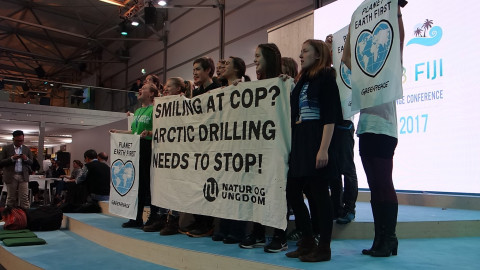
UK
Nicola Sturgeon, Scotland’s first minister, delivered an impressive speech at the negotiations calling for countries to honour the Paris agreement and keep average warming below 1.5 degrees. The Scottish government recently banned fracking, however failed to mention that they still import fracked gas from Pennsylvania, USA, therefore have moved the local destruction elsewhere and still contributing to global climate change.
The UK government has claimed to be leading the world to a coal phaseout as part of the ‘Powering Past Coal Alliance‘. Meanwhile, the UK delegation at COP23 was sponsored by the notorious high street bank, Barclays, who have £9.7 billion invested in fossil fuel projects including the North Dakota Access Pipeline and coal projects in Colombia. This was highlighted by the UK Youth Climate Coalition as part of a series of actions and articles pressuring UK delegates.
Germany
BUNDjugend (YFoE Germany) dirtied Germany’s reputation as an energy transition leader with a demonstration inside COP 23. Claiming to be giving out presents from the Energiewende (energy transition) Champion, they gifted passing delegates lumps of coal fresh from the largest hole in Europe, a lignite (brown coal) mine only 50km away from the talks in Bonn.
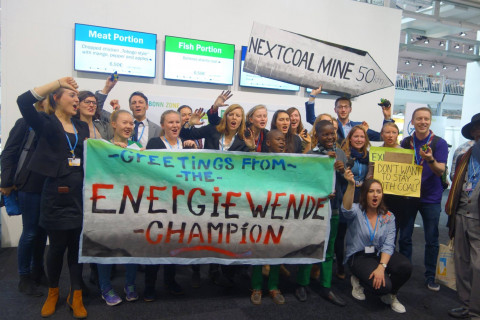
25,000 people marched in the streets of Bonn during the weekend before the talks started, calling for climate justice and an end to coal. This was the biggest anti-coal protest ever to have taken place in Germany.
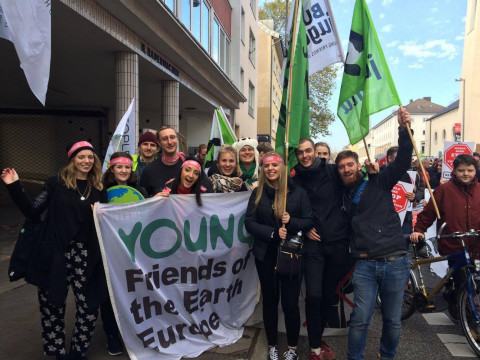
The following day, young people from across Europe and beyond travelled to Germany to participate in a mass direct action to block this enormous coal mine.
One participant stated: “Over 4000 people united to blockade a coal mine, putting their bodies on the line to halt production for a day and make a clear statement about the importance of taking action on climate now. We demonstrated that if our poliical leaders are not willing to stop destructive and dangerous energy projects, the people will do it for them. We have no choice not to.”
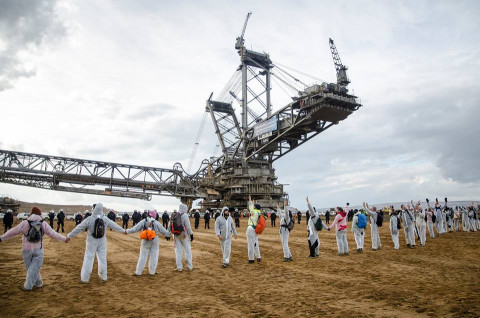
France
France showed shallow speeches and an environmental minister as impactful as a plastic plant. The Climate Plan and official environmental stands of the government are shallow and do not match up with their actual actions controlled by banks and dirty energy lobbies: supporting CETA, launching big neo-colonial scale mine projects “Golden Mountain” in Guyana etc. It was also discovered that they were negotiating a series of reforms with the EU, to make their commitment to the EU commision non-mandatory and flexible. I.e: they can change the target to less ambitious goals. They are delaying French transition away from nuclear energy. However, youth groups are standing up against such practice and are not fooled by the greenwashed, start-up “France” that Macron wants to sell. The Jeunesse Autochtone de Guyane, and other indigenous group in Guyana are standing up against the government, and will protect their land and the Amazon Forest.
“When one is hiding away in the western myth that the individual can and must succeed on his/her own, we forget that we are part of a whole, a global mesh that we cannot rule over. The project Golden Mountain is the result of this distorted vision of the world. It is a poisoned gift, from spirituality to economy” Yanuwana Tapoka, Jeunesse Autochtone de Guyane, le 8/11/2017 à Bonn au Tribunal International des Droits de la Nature.
Netherlands
As the dirtiest kid in the European Union class, the Netherlands has also been neglecting its duty to combat climate change for a long time. While the new government stated during COP23 that they want to be world leaders on climate, reducing CO2 by 49% by 2030, their plans are mainly based on carbon capture and storage (CCS). Those plans are unrealistic and extremely costly. The five remaining coal power plants in the country may stay in business until 2030, in direct contradiction to both their ambitions to be leaders on climate action and with the Paris Agreement.
And while residents in the north of the Netherlands are in constant (financial) dangers due to earthquakes created by the gas drillings, the new government has no intention to rapidly cut gas production any time soon. The government has even been ordered by the court to revise their gas production plans, after being sued over unclarity of residents’ safety with the current gas production.
Last summer, Young Friends of the Earth the Netherlands went with Young Friends of the Earth Europe to Groningen to show solidarity with the residents, who are fighting for their livelihoods.
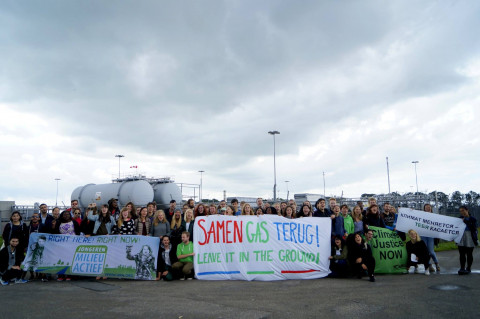
The message has been spelled out clearly by young people across the world that we need urgent, adequate climate action right now. For rich countries in the global north, this means an end to large and dangerous energy projects, no new fossil fuel projects, aiming to be carbon neutral by 2030 and financial and political support for countries and peoples already facing the harshest realities of climate change. If governments are not willing to deliver on this, they will be challenged in the streets, in elections and in the courts.

